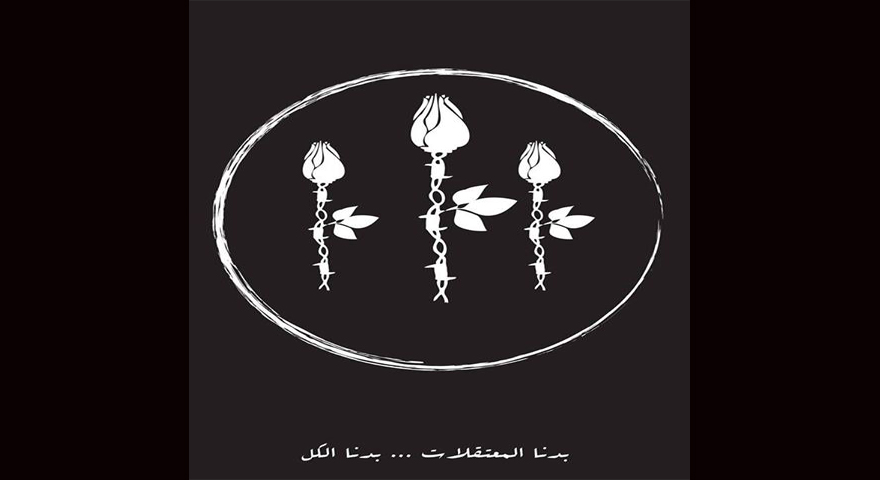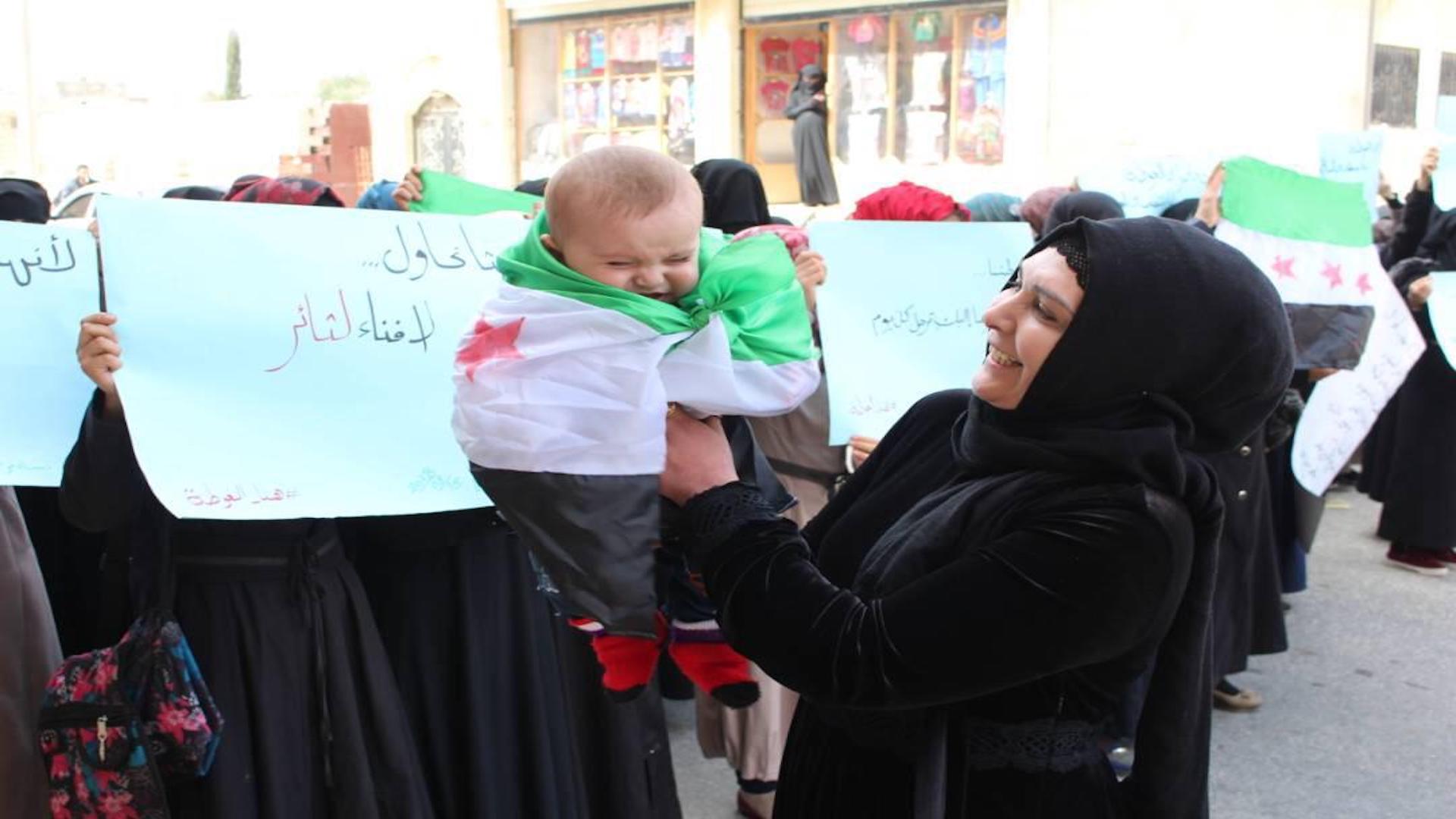When men come out of prison in Syria, they are celebrated like heroes. When women are released, they are shunned by their society and their morality is questioned.
The UN gave up counting casualties in the Syrian war since the beginning of 2014, but Syrians are still dying. Activists have been fighting ever since, one media campaigns after the other, to say that Syrians are still being killed, and they are not just numbers, that they are people whose life was cut short and they left behind loved ones.
Syria is in the headlines less and less, but when it is discussed, the world focuses first on the destruction and casualties. Second, the headlines focus on the injured, the orphaned, the refugees stranded in camps inside the country and in the region or risking their lives to cross the sea to get to Europe. The press talks about the tens of thousands detained incommunicado in the regime’s dungeons famous for being “industrial-scale killing machines”, though less often these days. Those that have survived detention and made it back out into the sun rarely get a second thought. There is simply not enough time nor resources left for them.
However, for many of them, the story does not end there, freedom from detention does not put an end to their suffering. The longterm consequences of such a traumatic experience often take years of treatment to heal. The world the detainee returns to is rarely as it was when they were arrested. Many come out to find they have lost their jobs, or their houses have been destroyed and their families displaced, or their spouses divorced them. At times they suffer any combination of those losses. In short, their life is gone.
Generally, the conservative nature of the Syrian society makes women who are detained more vulnerable, and they pay an even higher price. In a conservative society that hold chastity as a holy grail, being a victim of sexual assault can become an accusation in itself. The UN said that many women who were detained during the war in Syria, mostly by the regime and to a lesser extent by the armed opposition factions, were subjected to sexual violence. To add insult to their injuries, women find themselves forced to defend themselves and to emphasize the obvious: "It was not our choice to be detained”! These women suffer social stigma, and Amnesty reported about many cases when the released women’s families deny them and cut them off. In few cases, there was reports of women who were killed by their family members to wash the “shame” away.
Violence against women in the name of honor is widely spread in the region, and it is not restricted to them being raped or harassed in detention. An awakening is sweeping across the Arab world, and women in many Arab countries are trying to organize and push back. A recent campaign in Palestine, Tala’at (we are taking to the streets), saw thousands of women marching to protest domestic violence and honor killings that left more than thirty women dead in Palestine in 2018.
The war is still raging in north Syria. Idlib is the last opposition stronghold, and since April there has been a continuous aerial bombardment campaign by the Syrian regime and Russia who succeeded in retaking many towns in Southern Idlib province. None of that seemed to change the social code, and women who survived detention continued to suffer social stigma, in addition to the general suffering the war has brought on everyone in that region. These women suffering is largely forgotten.
But a group of journalists, some of whom survived detention themselves, tried to fight back and better their reality. Their work focuses on lifting the stigma and raising awareness and building solidarity among the female survivors themselves, and within the larger society. The best example of their work remains the campaign that was organized last spring, both online and by organizing workshops in Idlib and many other towns in northern Syria. The campaign was entitled Survivors, or Not Yet?, and it ran through May. They invited the locals and prominent individuals to listen to the survivors’ stories and to speak up in their defence. The campaign and their work in general aims to raise public awareness in the local communities to the harsh injustice those women are subjected to, and change the mindset some have towards female detainees. The group continued to publish other stories of survivors online in the past few months.
The work was organized through a collaboration between female media trainers, based outside Syria, who worked with and trained women, who live inside, to be emerging journalists. Some of whom are previous detainees. Then these trainee journalists interviewed several women that have gone through the traumatic experience of detention and continue to pay a very high price for it.
SyriaUntold spoke with Rita Khalil (pseudonym), one of the participating journalists and an a former detainee. She told us about how the idea for the campaign began: "we wanted to tell stories that concern us as women, stories that we can have access to as women, and that men cannot. Some of the participants said they know stories of women that have suffered social backlash after release, soon we found we know quite a few stories, and that this is a topic that is important to us and no one is talking about."
Rita was a university student when she was arrested. She said her family’s support after her release was essential to her recovery. Despite the harsh conditions of war and displacement, she has finally been able to register at the local Free Idlib University, and started working and earning an income. She said both those factors were crucial for her to feel her life is back on track and not all has been lost. But she is aware the story doesn't end so smoothly for others.
“I was fortunate to survive this terrible experience and come out stronger than before, thanks to my family’s support, my education and the work opportunities I was offered after my release. This makes me feel a heavy responsibility to tell the story to the world, to communicate the suffering of so many detainees still languishing under torture today, and to do all I can to help other women recover, and break the social stigma they are subjected to.”
Rita and her colleagues, with help from the news outlet Women of Syria that brought them together, decided to launch the campaign in collaboration with a number of other Syrian news outlets, to make sure the stigma is addressed and as many people as possible hear about it. The campaign was a success and gained momentum following on social media.
In one video, we hear the testimony of Riham from Hama, a woman who was arrested for a month when she was pregnant. “I wished I died in prison and not be released. Of course, this was because I feared people’s reaction to my imprisonment, their eyes were full of accusation when I was relased, especially my in-laws” she said. Instead of being concerned for her well-being and helping her recovering, everyone in her society was obsessed with one question: was she harassed or raped in prison? and Riham felt so alienated that she locked herself in her house for five months. Her husband was the only one who supported her and encouraged her to ignore the whispers, He helped her volunteer with the Civil Defence forces, and now Riham is speaking up to help others who might be experiencing the same social pressures.
It seemed to be changing the debate, and they continued posting survivors stories even after the campaign ended. But in August, and after months of aerial bombardment, the regime forces started advancing on the ground and recaptured many towns in Southern Idlib countryside. Once again, the women voices were lost and their cause deemed inconsequential. The local and international headlines became once more focused on the bombs, the casualties, and the new wave of displacement.
SyriaUntold talked to Zahra, a mother of eight from Homs who was featured in the campaign in the spring, and her suffering hadn’t stopped once released.
Zahra is a mother of eight, the eldest of which is still a teenager today. She used to suffer from slight weakness in her left eye before the revolution erupted in 2011, but it was not a big concern. In 2012, her husband was arrested by regime forces from their home in the city of Homs, he was later killed in detention. Wanting to protect her children from living in constant fear, she moved to Daraa, which was out of regime control at that time. There she made a living by distributing and delivering aid. As her work required her to travel around a lot, she would often help and allow other women and their children to accompany her on the road, if they needed to travel. Travelling was considered risky, but she has developed a good knowledge of the roads and a network of trust-worthy drivers.
Three years later, she was arrested at a regime checkpoint and taken to a security detention centre, where she suffered torture, beatings, threats and harassment. As a result, the condition of her eye worsened, and there was no adequate medical treatment. A few months after her arrest, she was transferred to the central prison in Adra, Damascus suburbs, where the conditions were better. There, she managed to communicate with her family and had the possibility of buying medication, but she she could hardly afford to. She was not allowed to see the specialist doctor she needed early enough, and she gradually lost sight in her left eye completely, and in her right eye partially.
She was finaly sent to a court, and she explained more about the charges and her trial: “After they failed to prove anything against me, a blind women, and they have the medical reports that prove it, the judge sentenced me based on the accusation of sharing a car with an ISIS fighter who drove a Douchka (military vehicle)."
She stood trial facing execution or life in prison, but the judge decided to sentence her to five years in prison, “I came back to my cell laughing. First, they all thought I was acquitted. I said five years. They were surprised, I said It is better than execution. But my heart was bleeding on the inside. I spent the next ten days silent and thinking: Five years away from my children!"
Zahra’s sister was almost the only person of her family she could call and communicate with regularly. Soon after her transfer to prison, she started telling her that her youngest child, 3-year-old at the time, was sick. She eventually told her he developed cancer, and he died a few months later. Zahra still lives with the guilt, she is convinced it was the sadness he felt for missing her that caused his illness.
The situation was rapidly deteriorating, her kids were by then living with her in-laws in Homs, and her in-laws were struggling to care for her children, while the battles left them displaced yet again. The next blow to Zahra was finding out that they married off her 13-year-old daughter to a man who lived in Saudi Arabia. It was heartbreaking for her not to be able to protect her daughter from such a fate: “this never would have happened if I was there. I would never marry her before she finished high school at least. She was just a child.”
Zahra was not able to communicate with her two elder sons, despite her repeated attempts and she was left wondering why her sister was refusing to let her talk to her kids. Her heart fell heavy, but she did not insist any further when she talked to her sister. Finally, after four and a half years in prison, she was released "early" for medical reasons. Almost blind, with no home left for her to go to, she went to her sister’s house in the suburbs of Homs.
There, her doubts and fears were finally confirmed, her two elder sons were also killed in a regime shelling that targeted her in-law's neighbourhood in Homs. Three of her eight children were now dead, and one married and travelled. The remaining four, the eldest of whom was 12-year-old, had to flee to Turkey, where they live alone in a flat in Istanbul with their slightly elder cousin. The flat was offered to them by a Turkish charity, and Zahra feels very grateful: “at least I know they are not out on the streets. They have a roof over their heads, and they do not go hungry. But they are just small kids, they need me. A teenage cousin is not a proper caretaker.”
As a result of the agreement reached between the EU and Turkey back in 2015 to limit the influx of refugees to Europe, Turkey imposed visa regulations on Syrians entering its territory. The visa was near impossible to attain, especially for someone in such precarious conditions as those of Zahra, so she was unable to join her children.
Up till this summer, she was living in rural Idlib. She shared a simple house with another woman whose husband is detained as well. Her housemate helped her run her daily errands, as she is unable to leave the house without a guide. She said she was fine finding her way around the house, she learned where everything is, but she could not go out to the street alone. Yet she did not give up.
“Many have told me they can help me get a visa, they come and ask for my story, they interview me and I tell them everything, then they go, and nothing changes. And I am left here waiting. But I will not give up, I will keep asking and trying. A young man that knows the governor of one of the states in Turkey told me he will speak with him about me, maybe they let me in. I have hope, and I as long as I live and breathe, I will not stop trying. I just want to be with them under one roof.”
Indeed, her persistence paid off, helped by the attention the Survivors, or Not Yet campaign garnered her. she was finally granted a visa to enter Turkey last August.
But hers is a unique success, while many of the other women continue to suffer. The war is merely making everyone oblivious to them again, and to the stories and voices this campaign tried to articulate and defend.






